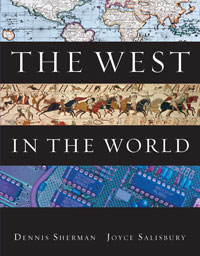 
The West in the World, 4th Edition (Sherman)Chapter 15:
Competing for Power and WealthCritical Thinking Questions- State-building and War
- Where and why did Russian and Brandenberg-Prussian strategic interests come into conflict?
- How did Catherine the Great's foreign policy make Russia a major world power?
- How did the Prussian state and Prussian society reflect the militarism of Frederick William I?
- What were the weaknesses of the Austrian Habsburg lands when Maria Theresa inherited them?
- How did Frederick the Great's domestic and foreign policy strengthen Prussia?
- How did the way wars were fought by European powers change during the eighteenth century?
- How did the parlements challenge the French king's authority?
- What was the relationship between the British king and Parliament in the eighteenth century?
- How did the slave trade form an integral part of the Triangle of Trade?
- The Twilight of Monarchies? The Question of Enlightened Absolutism
- What "enlightened" reforms did Frederick the Great and Joseph II enact?
- In what ways did their enlightened reforms fall short?
- How did enlightened rulers differ from the monarchs who had preceded them?
- Changes in Country and City Life
- What two developments were most important in bringing about an agricultural revolution in the late seventeenth and eighteenth centuries?
- What effect did enclosures have on small farmers, sharecroppers, and rural communities?
- What was the system of manufacturing known as cottage industry? How did it work? How did it affect rural peoples' lives?
- What factors contributed to population growth in eighteenth century Europe?
- The European population explosion translated into declining living conditions for certain groups of people. Who were they and how were their lives changed?
- What type of relations did the expanding urban middle class have with the social groups above and below them--the lower classes and aristocracy?
- The Culture of the Elite: Combining the Old and the New
- What new themes did authors explore in literature during this period?
- Why did novels reflect the values and interests of middle class society, while the fine arts continued to reflect aristocratic tastes?
- What role did the aristocracy and royal courts play in sponsoring art and music during the eighteenth century?
- How did musical styles change during the course of the century?
- In what ways was eighteenth century artistic culture "cosmopolitan?"
- Culture for the Lower Classes
- Describe the popular culture of the lower classes. How did these cultural outlets suit rural lives?
- What were the types of "literature" enjoyed by ordinary people?
- What forms of popular culture did both lower and upper classes share?
- In what ways did religion continue to manifest itself in European life and culture?
- What problems did ordinary people believe were developing within official churches? How did they respond?
- Foreshadowing Upheaval: The American Revolution
- How did the American colonists distance themselves from British regulations before the revolution?
- Why did tensions between Britain and the American colonies increase after the Seven Years' War ended?
- What were the colonists' major complaints about British rule?
- How did the Declaration of Independence justify the Americans' rebellion?
- Although the American constitution, Bill of Rights, and Declaration of Independence incorporated Enlightenment ideals to an unprecedented degree, how was the application of these ideals limited in reality?
 |  |
|





